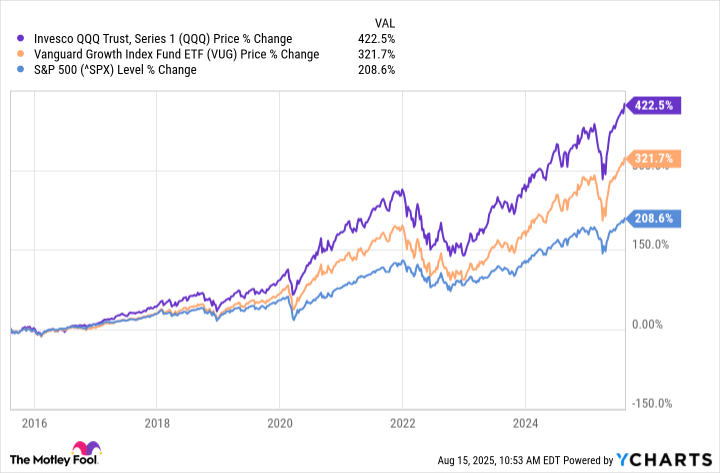It can be a great feeling to invest in a stock and progressively see your investment value grow over time. However, with individual companies, there are more risks, so you need to do a deeper dive into a company's business before you buy its stock. Investing in exchange-traded funds (ETFs) removes the need to do this, and in many cases, their returns can be just as good, if not better.
This ease and performance have likely contributed to the explosion in ETF investing over the past few years. According to accounting firm PwC, global ETFs had $14.6 trillion in assets under management (AUM) at the end of 2024, up 27% from the end of 2023. By 2029, it's estimated that global ETF AUMs could reach $26 trillion.

Image source: Getty Images.
Generally, a stock or ETF's performance is measured against the performance of the S&P 500, an index that tracks 500 of the largest public American companies, and is by far the stock market's most followed index. It's generally what people are referring to when they say "the market."
You can't predict how a stock or ETF will perform, but if you're looking to invest in a couple with market-beating potential, look no further than the Vanguard Growth ETF (VUG 1.94%) and the Invesco QQQ Trust ETF (QQQ 1.54%). Each takes a different approach but is positioned to outperform the market.
These ETFs have a history of outperforming
The Vanguard Growth ETF (VUG) focuses on large-cap companies that are expected to grow their earnings faster than the broader market (hence, the "growth" in the name). Along with that, a company must show strong revenue growth, a high return on equity (a measure of profitability and financial efficiency), and a high level of capital investments.
The Invesco QQQ Trust ETF (QQQ) mirrors the Nasdaq-100, an index that tracks the largest 100 non-financial companies on the Nasdaq stock exchange. This index is essentially a subset of the larger Nasdaq Composite, so it's fairly tech-heavy.
The criteria have worked out in both ETFs' favor, as they've noticeably outperformed the S&P 500 in the past decade.
Investing should always be about the future, but if you're looking for ETFs or stocks with market-beating potential, it helps to see if it has happened before. Past performance doesn't guarantee future performance but at least gives you a sense of what's possible.
Why are these ETFs built to continue outperforming the market?
To see why I believe these ETFs will continue to outperform the market, it's important to see the companies that are leading the way. Below are the companies that are in each of the ETF's top 10 holdings:
| Company | Percentage of VUG | Percentage of QQQ |
|---|---|---|
| NVIDIA | 12.64% | 10.00% |
| Microsoft | 12.18% | 8.74% |
| Apple | 9.48% | 7.83% |
| Amazon | 6.72% | 5.52% |
| Broadcom | 4.39% | 5.45% |
| Meta Platforms | 4.62% | 3.82% |
| Tesla | 2.69% | 2.75% |
| Alphabet | 6.01% | 5.16% |
Sources: Vanguard and Invesco. VUG percentages as of July 31. QQQ percentages as of Aug. 13.
These ETFs share eight companies in their top 10 holdings (nine if you separate both Alphabet classes). Since they make up over 66% (VUG) and 54% (QQQ) of the ETFs, they have a huge influence on their performances. They give the ETFs market-beating potential for three reasons: cloud computing, artificial intelligence (AI) infrastructure, and overall dominance in the digital ecosystem.
Amazon, Microsoft, and Alphabet are by far the cloud computing leaders (63% combined market share), and their platforms are the backbone of AI development. Nvidia's graphics processing units (GPUs) are the industry standard and go-to.
Broadcom supplies critical pieces to data centers and overall tech. Apple is still the world's leading consumer tech company (with AI momentum building), and Meta's scale gives it unmatched advertising reach.
Those are market leaders in industries that are primed for continued high growth for the foreseeable future. If I had to bet on ETFs to beat the market, it would be ones with those companies leading the way.







